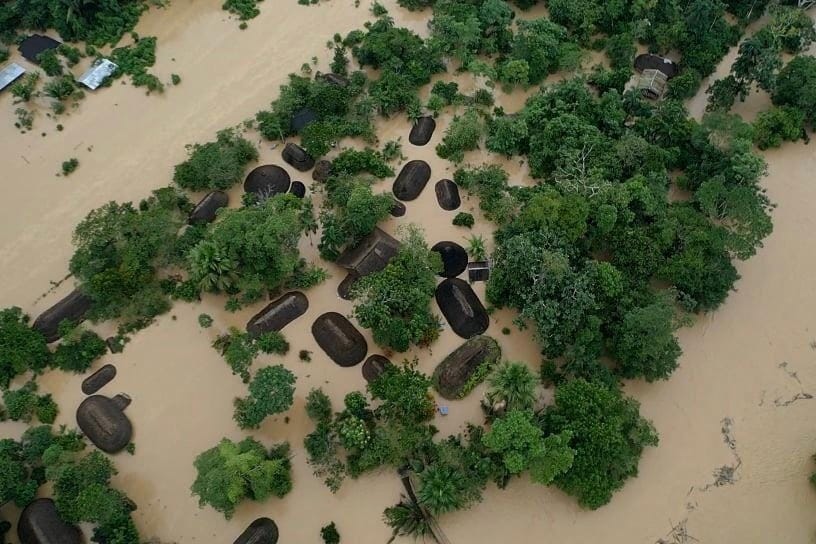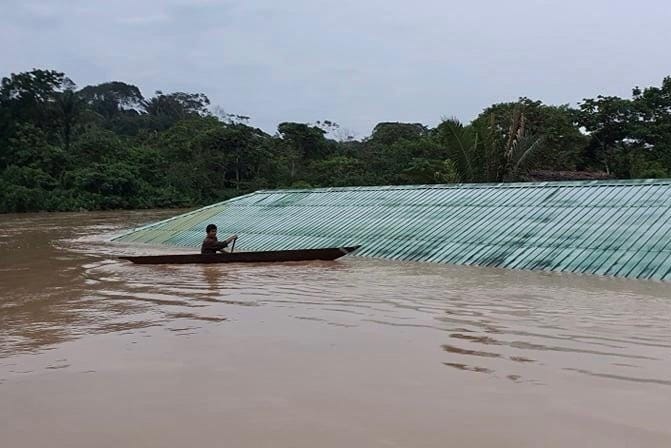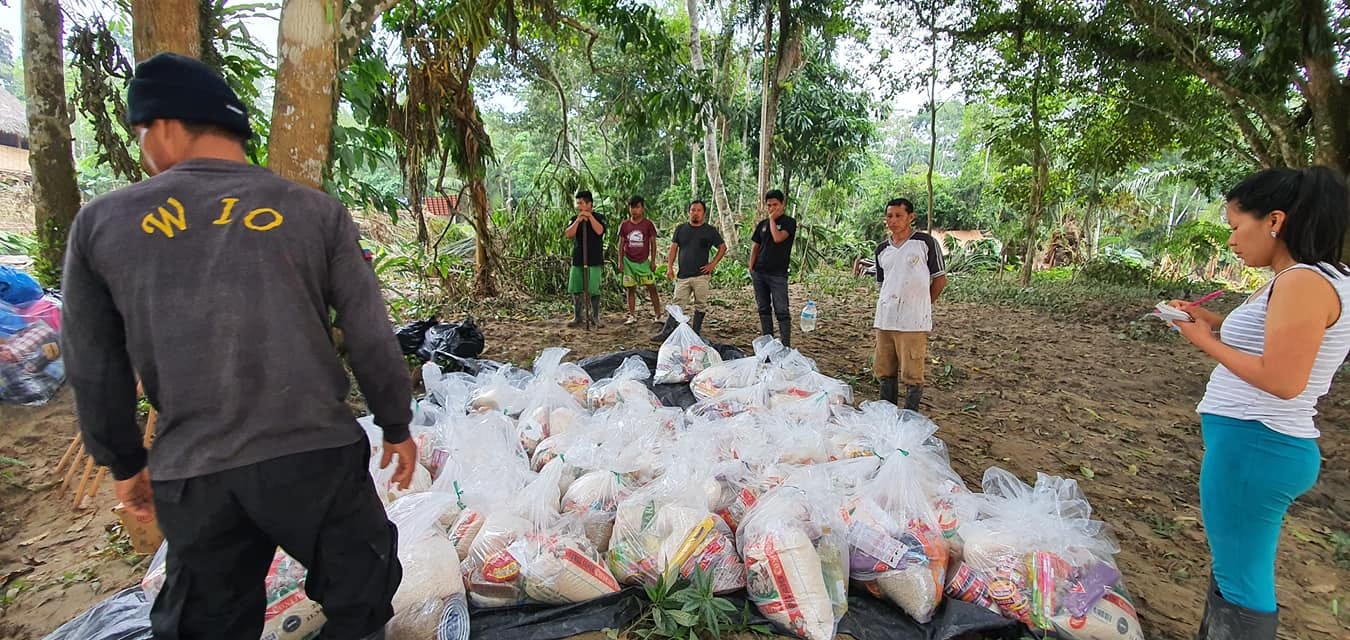#15 - 'It’s never risen like that': flooding in the Ecuadorian Amazon
By Jocelyn Timperley in San José, Costa Rica
Hello, and welcome to this latest edition of From a Climate Correspondent, a newsletter exploring the climate crisis around the globe.
We share personal reflections on the fight against climate change, highlighting key science and policy developments and sharing some of the best environmental journalism about the regions where we live – East Africa, Asia-Pacific, Latin America and South Asia.
Thanks for reading!
From a Climate Correspondent team - India, Jocelyn, Lou and Mat
'It’s never risen like that': Floods in the Ecuadorian Amazon
Letter no.15 by Jocelyn Timperley, San José, Costa Rica

Photo credit: Pueblo Kichwa de Sarayaku
Last week, as the coronavirus pandemic continued to escalate around the world, a more localised emergency was unfolding in a small corner of the Ecuadorian Amazon.
The Bobonaza river, which passes through a mosaic of indigenous towns and villages, was rising at a rate local communities had never seen before. People used to dealing with the threat of deforestation and oil expansion into their territories faced yet another challenge.
They quickly sent out word that a flood had hit them. Many did not even have time to collect up their things before the waters had inundated their houses.
“The river rose about 15 meters in the basin. It’s never risen like that,” says Melva Patricia Gualinga Montalvo, a leader of the Kichwa people in Sarayacu, one of the impacted riverside indigenous towns in Pastaza province. “It covered all the houses and wrecked them. It devastated everything: schools, high schools, solar panels, homes, crops, vegetable gardens, little plots with chickens, everything that was in its path, leaving the indigenous peoples in the most terrible situation.”

Photo credit: Pueblo Kichwa de Sarayaku
The water left a metre of mud on top of everything it passed, says Gualinga. Three suspension bridges that sat around 15 meters over the river were damaged. She estimates that 700 people in her town alone, around half of its population, have been impacted. Some lost their kitchens, others their crops, but around 30 families whose wooden houses were swept away have been left with “absolutely nothing”, she says.
“They were left with only what they had on their backs. Their houses, their pots, everything, everything gone.”
Fighting on all fronts
A host of other communities have been affected by the floods, which also occurred in two other nearby rivers. But with the Ecuadorian government focusing on the coronavirus pandemic, the reaction to the flood has been slow.
The country has seen a rapid increase in COVID-19 cases over the past days, reaching almost 1000 reported cases by Tuesday, the most of any Latin American country bar Brazil. Ecuador has taken strong measures in recent days to stop the spread of the virus, including imposing a night time curfew and completely closing its borders to foreigners and nationals alike. In one incident last week, local authorities in Guayaquil, Ecuador’s largest city, ordered trucks onto the runway to prevent a Spanish repatriation plane from landing. (The plane eventually landed in Quito.)
When I spoke to Gualinga on Monday, she said government representatives had only arrived the day before - five days after the flood - to begin to evaluate the situation. Her community had not received any help at all from the government yet, she said.
“The government has sent a message saying that we need to be patient. That they are going to help us, but that we need to have patience,” says Gualinga. “It’s been seven days that the people have not received help.”
Many of the families in Sarayaku who lost their homes are now camped out in the church and the local catholic mission - not the most ideal situation for social distancing.
Oil state
The relationship between the Kichwa people of Sarayaku and the government is fragile at best. In 2012, the Kichwa won a case against the government at the Inter-American Court of Human Rights over unauthorised oil development in their territory, bringing the community to international recognition. The ruling centred on the local community’s right to consultation before industrial projects were developed on their lands: something that had not happened.
Protests in the country last year led by indigenous peoples also forced the government to backtrack on imposing a set of austerity measures requested by the International Monetary Fund (IMF).
“It is complicated for us,” says Gualinga. “As we are communities which have fought against climate change, to stop them extracting oil, mining and destroying the Amazon, it is hard to see the authorities or the government supporting us or trying to get us out of this crisis.”

Photo credit: Pueblo Kichwa de Sarayaku
Sarayaku has instead set up its own fundraising campaign to help people rebuild their homes, which by Tuesday had raised almost $40,000. On Sunday three canoes arrived with essential supplies paid for by the money raised. “Sarayaku is a town that is known for its resistance, and everything else we have done,” says Gualinga. “We need to get back on our feet, and to do that we are asking for international support and solidarity.”
The Ecuadorian government continues to push oil production, which accounts for around 30% of government revenues and is seen as the key means to lower the country’s fiscal gap and reduce public debt. The fight against oil development in Ecuador is very much alive = the country’s latest drilling campaign was announced just two weeks ago - but falling oil prices are likely to complicate things for the country.
The International Energy Agency has warned that Ecuador is “vulnerable” to being particularly hard hit by the global oil price slump, with the country’s oil and gas revenues potentially falling 85%. “International financial institutions may need to step in and take special measures,” said Fatih Birol, chief of the IEA, last week. It’s a move unlikely to be welcomed by indigenous communities.
Climate impact
It’s way too early for any studies to have linked the flood to climate change. But the events of the past week form part of a wider picture of more severe floods in the Ecuadorian Amazon over the last ten years, Carlos Larrea, professor of the environment and sustainability at the University Andina Simón Bolivar in Quito, tells me.
“The probability of having the floods has increased substantially as a result of climate change,” he says.
The effects of climate change in the Western Amazon - largely Peru, Colombia and Ecuador - will be likely different than in much of Brazil, due to the proximity between the Amazon and the Andean mountains, says Larrea. “The most important difference is that the climate won't be more dry. Nevertheless we need to understand that the Amazon functions as an integrated system.”
But Ecuador is struggling to protect its portion of the Amazon. Its deforestation rate sits at around 0.6% a year, says Larrea. The country lacks an effective policy to reduce deforestation, he says, while expansion of the oil industry over the past 50 years and large scale copper and gold mining in the past 5-10 have also impacted the Amazon region.
“These combined effects are putting the Amazonian region at very high risk. The effects are pollution, reduction of biodiversity, reduction of biodiversity, health hazards for indigenous communities. And also, obviously, an increasing risk of climate change.”
For Gualinga, it is crystal clear that the flood is connected with climate change. The sad irony that people fighting so hard to protect the environment are being hit by the impacts of climate change which they have not contributed to is not lost on her.
“There has not been [a flood like this] in our history or the history of our grandparents,” she says, noting her 96-year-old father and 86-year-old mother have experienced nothing like this. “It is a very serious consequence of the impact of climate change when the most affected are those peoples who are constantly fighting to defend nature.”
The coronavirus pandemic seems likely to continue to threaten and disrupt lives across the world for at least several months to come. But it is vital that the understandable focus on the pandemic does not mean news of climate impacts are buried behind the headlines, ignored. Too many people on the front lines of climate change do not have this option.
Must reads from the region
Why did Ecuador's tallest waterfall suddenly disappear? Antonio José Paz Cardona, China Dialogue (originally published in Mongabay LatAm) On February 2 2020, the emblematic San Rafael waterfall strangely disappeared from its home of thousands of years. Paz Cardona explores the possible explanations for the change, and what its impacts may be on the surrounding region.
Bringing Christ and coronavirus: evangelicals to contact Amazon indigenous, Sue Branford, Mongabay Branford details the frustrating plans by an evangelical Christian organisation to contact and convert isolated indigenous groups in the remote Western Amazon - just as the coronavirus begins spreading widely in Brazil. The religious group, Ethnos360, previously spread disease among the Zo’é living in northern Pará state, who lost over a third of their population after the contact, the article says. Analysts are concerned that Brazil may be about to overturn its longstanding policy against contact with isolated groups.
Ecuador: Historical victory of the indigenous and popular movements Professor Miriam Lang In a piece written last October, Lang a professor at the Universidad Andina Simón Bolívar in Quito, details the background to Ecuador’s mass protests last year. The outcome, which saw the government back down on planned austerity measures and withdrawal of workers rights, was “an unprecedented victory”, she says. “Now, the country faces the challenge of recomposing after heavy human rights abuses and an outbreak of racism and classism in social networks. It also has to build a profoundly different economic policy which takes plurinationality into account.”
Five of the world's largest banks are pouring billions into the Amazon's destruction Dharna Noor, Earther The links between the virus and climate change are yet to be fully unravelled, but early indicators suggest that even as China’s enforced slowdown lowers both its emissions and fossil fuel demand, it is also impeding production of solar panels and electric cars.
What else I've been watching...
This 2012 documentary from Eriberto Gualinga (Patricia Gualinga’s brother) and Amnesty International details the journey of the Kichwa people to the Inter-American Court of Human Rights, based in Costa Rica, to defend their right to be consulted on oil exploration in their ancestral land.
I also watched this hauntingly beautiful 2016 Bolivian arthouse film, Dark Skull, as part of an slightly haphazard online film club. We all watched the film then discussed it for an hour on Zoom, which worked wonders as a social break. The film tells the story of a young man returned to his home region after the death of his father who takes his job in a local tin mine.
And lastly, Washington’s Environmental Film Festival has uploaded a selection of its cancelled 2020 Festival schedule - most of which are free to stream.
Been forwarded this email?
Did someone send this on to you? Why not sign up yourself?


